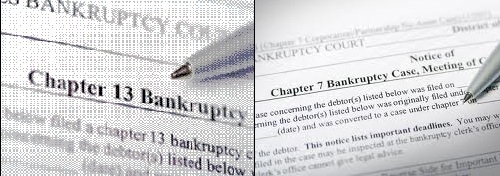Chapter 13 vs. Chapter 7 options
Why Chapter 13 Bankruptcy Is Usually A Better
Option For Some Folks
It’s vitally important that you deal with the financial issues to figure out what chapter bankruptcy is right for you. Most people assume Chapter 7 bankruptcy is the better of the two. Why? Chapter 13 bankruptcy makes debtors pay back some of their debt; chapter 7 bankruptcy wipes them out entirely.
You won’t be eligible to file for a chapter 7 bankruptcy if you’ve already had one in the last eight years. And, you’ll be ineligible for the chapter 7 bankruptcy if you had a chapter 13 bankruptcy discharged in the last six years.

Chapter 13 vs. Chapter 7: When Is It More Advantageous For You
If you’re eligible to file for both a Chapter 7 and Chapter 13 bankruptcy, you might find that filing for the Chapter 13 bankruptcy is better for you. How so? Here’s an example:
You have fallen behind on a car loan or home mortgage. You have a desire to pay those missed payments over a period of time so you can go back to the original agreement.
In this instance, a chapter 7 bankruptcy doesn’t allow you to do this. Payments may only be made up on the chapter 13 bankruptcy. The chapter 7 bankruptcy cannot discharge student loan debt, tax obligations, etc. However, the chapter 13 bankruptcy protection allows you to include them and pay them over a predetermined amount of time.
You may have a sincere desire to pay back those debts but you need the bankruptcy court’s protection to pull it off. This is especially important if the creditors keep harassing you or you just need a formal schedule and deadlines. A chapter 13 bankruptcy process can provide this to filers so they meet all their good intentions.
If you’ve got non-exempt property you’d like to hold onto, a chapter 7 bankruptcy does not protect it. The only thing you get to keep in the chapter 7 bankruptcy is exempt property. Non-exempt property must be given over to a bankruptcy trustee who will sell it and dispense the profits to the creditors. With a chapter 13 bankruptcy, you don’t need to give up your non-exempt property. Rather, the income is enough to pay back the debts. If you’ve got non-exempt property you don’t want to give up, you should consider the chapter 13 bankruptcy protection.
Should you have a co-signer on personal debt and file for chapter 7 bankruptcy, you’ll be cleared of the debt but your co-signer will still have to pay for it. Thus, your creditor will go after the co-signer for payments. However, a chapter 13 bankruptcy plan keeps the co-signer out of the situation but you must make your payments.